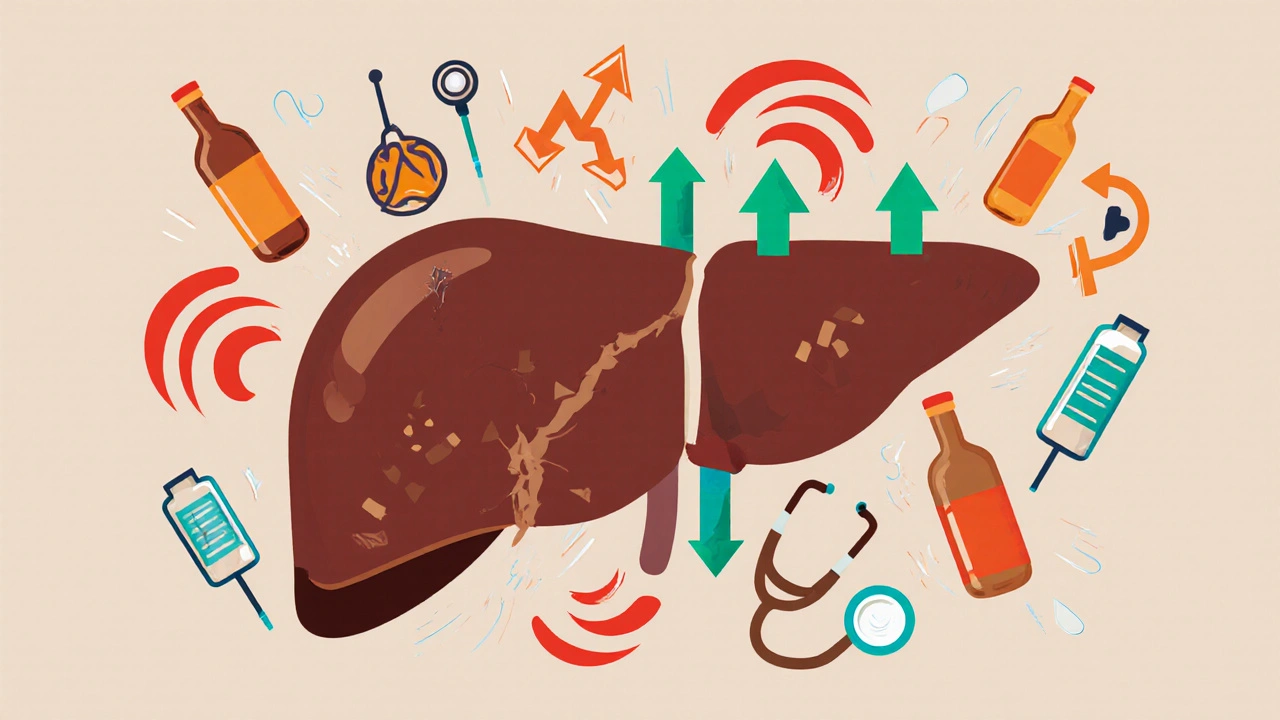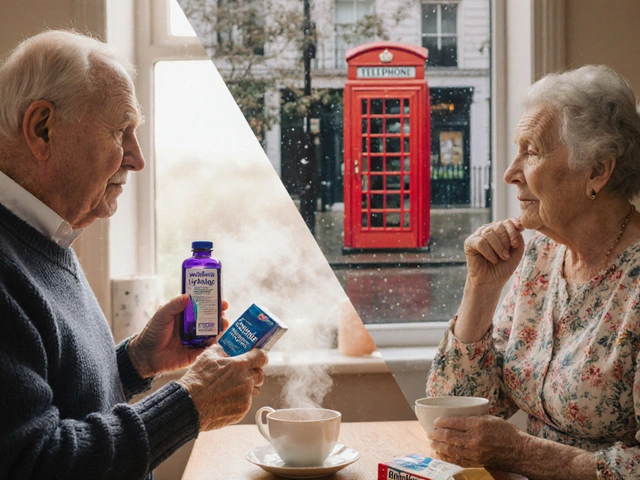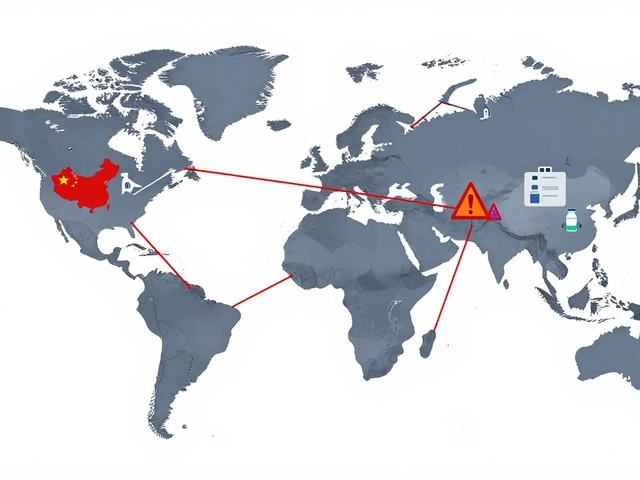When someone stops drinking after years of heavy alcohol use, their body doesn’t just feel shaky-it’s in crisis. The liver, which has been working overtime to break down alcohol, suddenly has to reset. But here’s the catch: stopping alcohol doesn’t automatically heal the liver. In fact, the first few days after quitting can be the most dangerous time for liver function-even though you’re no longer drinking.
What Happens to Your Liver During Alcohol Withdrawal?
Your liver handles about 90% of the alcohol you consume. It turns ethanol into acetaldehyde, a toxic byproduct, then into acetate, which your body can use for energy. But when you’ve been drinking heavily for months or years, your liver gets overwhelmed. Fat builds up. Inflammation kicks in. Scar tissue starts forming. This is called alcohol-related liver disease (ALD), and it can range from simple fatty liver to alcoholic hepatitis and cirrhosis. When you stop drinking, your liver doesn’t instantly start healing. In fact, research shows that within the first 7 days of withdrawal, liver enzymes like AST and ALT can actually spike-sometimes by 30% or more. Why? Because your body’s metabolism shifts. Blood flow to the liver changes. The stress of withdrawal triggers inflammation, even without alcohol present. This is why some people feel worse physically after quitting than they did while drinking. A key warning sign? An AST-to-ALT ratio higher than 2:1. Normal ratios are below 1:1. If your ratio is above 2, it’s a strong indicator of long-term alcohol damage. Other red flags include low albumin (under 3.5 g/dL) or a prothrombin time (INR) over 1.5. These mean your liver isn’t making enough proteins or clotting factors-and that’s serious.The Hidden Danger: Paracetamol After Quitting
One of the most overlooked risks after alcohol withdrawal is taking common painkillers like paracetamol (acetaminophen). You might think, “I’m not drinking anymore, so it’s safe to take Tylenol for my headache.” But that’s exactly when your liver is most vulnerable. A 2002 study found that people in early withdrawal who took just 1-2 grams of paracetamol a day-half the recommended daily limit-saw the biggest spikes in liver enzymes. Why? Alcohol use depletes glutathione, your liver’s main antioxidant. Even after you stop drinking, it takes weeks for glutathione levels to recover. Without enough of it, paracetamol turns into a toxic compound that destroys liver cells. If you’re going through withdrawal, avoid paracetamol completely. Use ibuprofen instead, but only if your kidneys are healthy. Always check with a doctor before taking any medication, even over-the-counter ones.Safe Detox: Why Medical Supervision Isn’t Optional
Trying to quit alcohol alone at home sounds brave-but it’s risky. About 5% of people with severe alcohol dependence develop delirium tremens (DTs) within 48-72 hours after their last drink. DTs cause confusion, seizures, hallucinations, and can be fatal. The death rate without treatment is up to 35%. With medical care, it drops to under 5%. Medically supervised detox reduces complications by 30% compared to home attempts. Doctors use benzodiazepines like chlordiazepoxide to calm the nervous system and prevent seizures. These drugs work because they target the same brain receptors as alcohol, easing the shock of withdrawal. But detox isn’t just about stopping shaking. It’s about protecting your liver. Studies show that patients under medical care have 30% less liver enzyme elevation than those who detox alone. Why? Because professionals monitor your vitals, give you the right nutrients, and avoid harmful drugs.The Right Nutrition for Liver Healing
Your liver needs fuel to repair itself. During withdrawal, many people lose their appetite. That’s dangerous. Without proper nutrition, recovery slows-or stops. The key is protein: 1.2 to 1.5 grams per kilogram of body weight every day. For a 70kg person, that’s 85-105 grams of protein daily. Think eggs, lean meat, fish, tofu, lentils, Greek yogurt. Protein helps rebuild liver cells and prevents muscle wasting. Vitamins matter too. Thiamine (vitamin B1) is critical. Heavy drinkers are often severely deficient. Without it, you risk Wernicke-Korsakoff syndrome-a brain disorder that causes memory loss, confusion, and eye problems. Doctors give 500mg IV daily for 3-5 days at the start of detox. After that, oral supplements of 100mg daily are recommended. Other important nutrients: zinc, magnesium, and vitamin B12. These help reduce inflammation and support enzyme function. A multivitamin won’t cut it-targeted supplementation is needed.How Long Does Liver Recovery Take?
The good news? Your liver is one of the few organs that can regenerate. But it needs time-and total abstinence. If you have fatty liver (the earliest stage), stopping alcohol for 6 weeks can reverse it. Liver enzymes often normalize within 7-14 days. You might feel more energy, sleep better, and notice less bloating. For alcoholic hepatitis, recovery takes longer. It can take 4-8 weeks to see real improvement. If caught early, this condition can be reversed. But if you keep drinking, it turns into cirrhosis-and that’s permanent scarring. A 2021 study in Scientific Reports found that even people with advanced liver damage saw significant improvement in liver function within 3-12 months of quitting. Some had scar tissue reduce by up to 40%. But none of this happens if you drink again-even once.What Doesn’t Work: Tapering, Home Remedies, and Detox Teas
Some people try to quit by slowly cutting back. But tapering doesn’t work well for heavy drinkers. A 2021 study found that while 60% of mild cases succeeded, 35% of moderate-to-severe cases relapsed. Why? Your body still gets exposed to alcohol toxins, and your liver never gets a full break. Detox teas, juice cleanses, and herbal supplements? They’re useless-and sometimes harmful. Many contain ingredients that stress the liver, like kava or green tea extract in high doses. Your liver doesn’t need a “flush.” It needs rest, protein, vitamins, and zero alcohol.Long-Term Success: Staying Off Alcohol
Detox is just the first step. The real challenge is staying sober. Research shows 70% of people who complete detox but don’t get ongoing support relapse within six months. And every drink you take after recovery resets the healing clock. Even one drink a week can cause inflammation and slow liver repair. Support systems matter. Therapy, Alcoholics Anonymous, or telehealth counseling can make a huge difference. In rural areas, telemedicine programs have increased access by 25% since 2020. If you’re in a remote location, look for virtual recovery programs.When to See a Doctor
You don’t need to wait until you’re in crisis. If you’ve been drinking more than 14 standard drinks a week for over a year, talk to your doctor before quitting. They can check your liver enzymes, INR, and albumin levels. If you have any of these symptoms, get help immediately:- Severe confusion or disorientation
- Seizures
- High fever or rapid heartbeat
- Yellow skin or eyes (jaundice)
- Swelling in your belly or legs
Final Thoughts: Healing Is Possible
Quitting alcohol is one of the hardest things you’ll ever do-but it’s also one of the most powerful things you can do for your liver. The damage isn’t always permanent. Even after years of heavy drinking, your liver can recover-if you give it the right conditions: no alcohol, proper nutrition, medical supervision, and time. This isn’t about willpower. It’s about biology. Your liver doesn’t care how much you want to quit. It only responds to what you give it. Stop the poison. Feed it the right fuel. Let it heal.Can you reverse liver damage from alcohol?
Yes, but only if you stop drinking completely. Fatty liver can reverse in 6 weeks. Alcoholic hepatitis can improve significantly in 4-8 weeks if caught early. Even cirrhosis can stabilize, and some scar tissue may reduce over 3-12 months of abstinence. But once you start drinking again, the damage returns-and worsens.
Is it safe to quit alcohol cold turkey?
Only if you’ve been drinking lightly (under 3 drinks a day) for a short time. For anyone with a history of heavy or long-term drinking, quitting cold turkey can trigger seizures or delirium tremens. Medical supervision reduces these risks by 95%. Never attempt withdrawal alone if you’ve been drinking daily for more than a few months.
What should you avoid during alcohol detox?
Avoid paracetamol (acetaminophen), NSAIDs like high-dose ibuprofen if you have kidney issues, herbal detox teas, and energy drinks. Also avoid caffeine-heavy beverages and sugary foods-they worsen anxiety and blood sugar swings. Stick to water, electrolyte drinks, lean protein, and vegetables.
How long do withdrawal symptoms last?
Mild symptoms like anxiety, tremors, and nausea usually peak within 24-72 hours and fade within a week. Insomnia and mood swings can last 2-4 weeks. Severe symptoms like hallucinations or seizures happen within the first 48-96 hours. Medical detox helps control these and prevents them from getting worse.
Can you drink again after your liver heals?
For mild fatty liver, some doctors may allow very limited drinking after 6 weeks of abstinence-no more than 14 units per week. But for any advanced damage like hepatitis or cirrhosis, lifelong abstinence is required. Even small amounts of alcohol can restart inflammation and scarring. If you’re unsure, don’t risk it.








Summer Joy November 20, 2025
I quit drinking 3 months ago and my liver enzymes went from AST 120 to 38. I thought I was fine until I took Tylenol for a headache and felt like I was gonna die. 🤢 Don't be me. Avoid paracetamol like it's a cursed relic. Your liver is already crying, don't make it scream.
Aruna Urban Planner November 22, 2025
The biochemical cascade during early withdrawal is a fascinating interplay of metabolic dysregulation and oxidative stress. Glutathione depletion is a critical bottleneck in phase II hepatic detoxification pathways. Without adequate substrate, NAPQI accumulation leads to hepatocellular necrosis. Paracetamol, even at subtherapeutic doses, becomes a Trojan horse in this context. Nutritional repletion with N-acetylcysteine precursors may offer a safer alternative.
Nicole Ziegler November 22, 2025
I didn’t know paracetamol was a trap 😱 I took it after my last drink and thought I was being smart. My liver is now my ex. No contact. Ever. 🚫🍷
Bharat Alasandi November 23, 2025
Man, this hits different. I was in and out of detox 3 times before I got it. Protein saved me. Eggs for breakfast, chicken for lunch, lentils for dinner. No more ‘I’ll eat later’. Your liver ain’t gonna forgive you for skipping meals. Trust me.
Kristi Bennardo November 24, 2025
This article is dangerously irresponsible. You're telling people to avoid paracetamol but offering no clinical guidelines? What if they have chronic pain? What if they're post-surgical? This is fearmongering disguised as medical advice. You're not a doctor. Stop pretending.
Shiv Karan Singh November 25, 2025
LMAO so now we’re blaming paracetamol? Next they’ll say breathing is bad for your liver. I’ve seen people take 1000mg of acetaminophen daily for years and their liver’s fine. This is just another scare tactic to push rehab centers. Wake up.
Ravi boy November 27, 2025
yo i quit last year and i just ate a bag of chips and took ibuprofen and my liver still works lmao idk why everyone is so scared. i dont even take vitamins. i just drink water and sleep. its not that hard
Matthew Karrs November 28, 2025
Let me guess - this whole thing is funded by Big Rehab. They want you scared so you pay $20k for a 28-day program that just gives you water, a blanket, and a pamphlet. The liver regenerates naturally. You don’t need a doctor to tell you to stop drinking. And paracetamol? That’s a myth spread by pharma to sell NAC supplements.
Matthew Peters November 29, 2025
I had cirrhosis at 42. Didn’t believe the doctors. Thought I was fine because I stopped drinking. Then I got jaundiced. Turned out my AST was 240. They gave me IV thiamine and told me to eat 100g of protein a day. I cried. I ate eggs for the first time in years. 11 months later? My fibroscan showed 30% less scarring. It’s not magic. It’s biology. And it’s real.
Liam Strachan December 1, 2025
This is actually really helpful. I’ve been trying to cut back for months and was terrified to quit cold turkey. The bit about medical supervision reducing complications by 30% was a wake-up call. I’m booking a consult tomorrow. Thanks for laying it out so clearly.
Dana Oralkhan December 2, 2025
To everyone saying 'I took Tylenol and I'm fine' - you're lucky. Not everyone gets a second chance. If you're reading this and you're still drinking, please hear this: your liver doesn't have a voice, but it's screaming. You don't need to be a saint to heal. You just need to stop poisoning it. One day at a time.
Summer Joy December 2, 2025
LMAO @Ravi boy you think it's easy? I had delirium tremens. Saw spiders crawling on my walls. Thought my cat was talking to me. I was in ICU for 5 days. Your 'water and sleep' is not a detox plan. It's a death sentence waiting to happen.
Ron and Gill Day December 4, 2025
I’ve read this exact article 3 times in the last year. Same words. Same stats. Same ‘your liver will heal’ fairy tale. Here’s the truth: if you’re rich enough to afford rehab and supplements, sure. But what about the guy working two jobs with no insurance? You’re not healing. You’re just being sold a product. This isn’t science. It’s marketing.
Nicole Ziegler December 5, 2025
@Summer Joy I’m so sorry you went through that 😭 I’m 2 months sober and I still avoid anything with acetaminophen. I even switched to CBD for headaches. No regrets. You’re not alone.